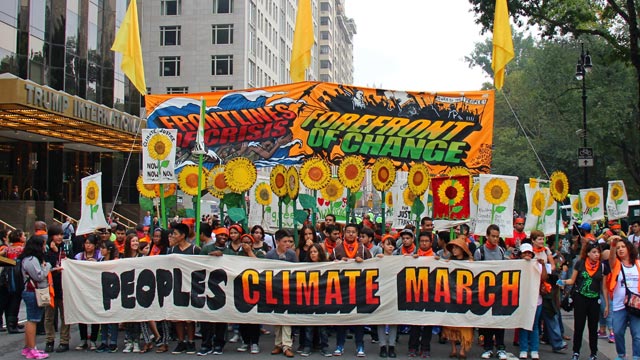Durban climate talks
Paris COP21: Seattle-style shutdowns or another climate cul de sac?

400,000-strong climate march, New York, September 21, 2014.

Whose turn to carve?
March 18, 2013 -- In Durban, South Africa, five heads of state meet on March 26-27, 2013, to assure the rest of Africa that their countries’ corporations are better investors in infrastructure, mining, oil and agriculture than the traditional European and US multinationals. The Brazil-Russia-India-China-South Africa (BRICS) summit will also include 16 heads of state from Africa, including some notorious tyrants. A new $50 billion bank will probably be launched.

Trade unionists joined a march in Doha for action on climate change to demand improved human rights for migrant workers. Photograph: Karim Jaafar/AFP/Getty Images.
Statement by the international peasant movement La Via Campesina,
December 7, 2012 – As the climate negotiations come to a close, the industrialised countries insist on inaction for the next decade, finding even more ways to escape their historical responsibility, create more carbon markets including one on agriculture and to keep business as usual of burning the planet.
While governments continue to prioritise the interests of industry and agribusiness, peasant farmers continue producing to feed the world’s people and the planet.
BRICS bloc’s rising ‘sub-imperialism’: the latest threat to people and planet?

President Dilma Rousseff of Brazil, Russian President Dimitry Medvedev, India
South Africa: What has Hurricane Sandy taught the ruling elite?

Storm surge from the cyclone in Durban, March 2007.
By Patrick Bond
Climate Connections, June 18, 2012 -- What’s wrong with the green economy?: Joanna Cabello of Carbon Trade Watch at Rio+20.
For more coverage of the Rio+20, click HERE.
By Patrick Bond, Rio de Janeiro
June 18, 2012 -- Links International Journal of Socialist Renewal, a version of this article also appeared at Climate and Capitalism -- Given the worsening world economic crisis, the turn to "Green Economy" rhetoric looms as a potential saviour for footloose financial capital, and is also enormously welcome to those corporations panicking at market chaos in the topsy turvy fossil-fuel, water, infrastructure construction, technology and agriculture sectors.
On the other hand, for everyone else, the Rio+20 Earth Summit underway this week in Brazil, devoted to advancing Green Economy policies and projects, appears as an overall disaster zone for the people and planet.
After the Durban climate talks: State and market climate failures amplified by civil society failure

By Patrick Bond, Durban
February 28, 2012 -- Links International Journal of Socialist Renewal -- In 2007, former World Bank chief economist Nick Stern termed climate change the worst "market failure" in history – since those who pollute with greenhouse gases are not charged, and since they threaten future generations and vast swathes of natural life – and at that moment, even the 1991 ravings of another former World Bank chief economist, Larry Summers, made sense.
"I think the economic logic behind dumping a load of toxic waste in the lowest-wage country is impeccable and we should face up that", according to a memo with Summers’ signature, although actually Summers was a mere plagiarist of Harvard economist Lant Pritchett’s genius, insiders allege.
‘Global sustainability’ wilts in South Africa’s political hot air

By Patrick Bond, Durban



